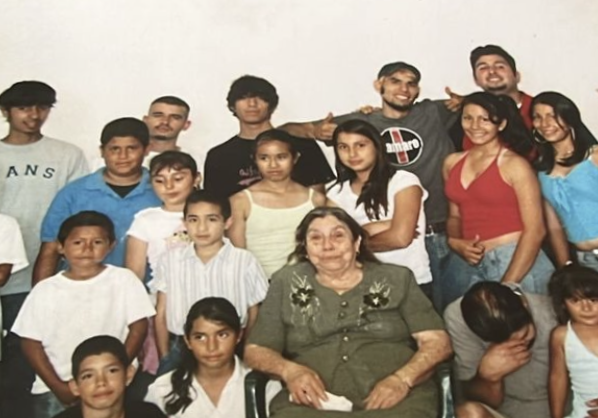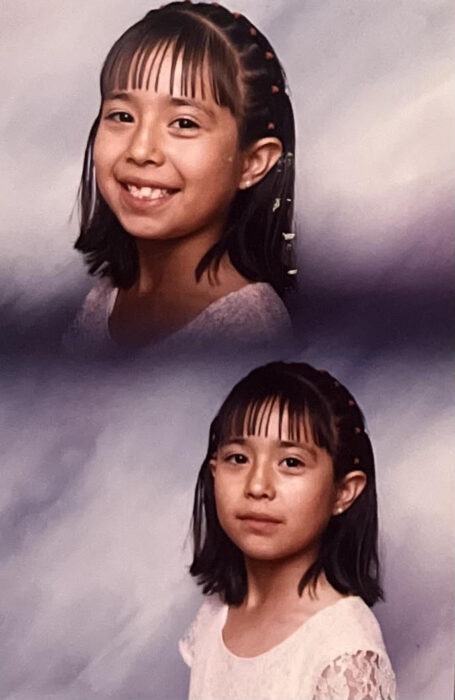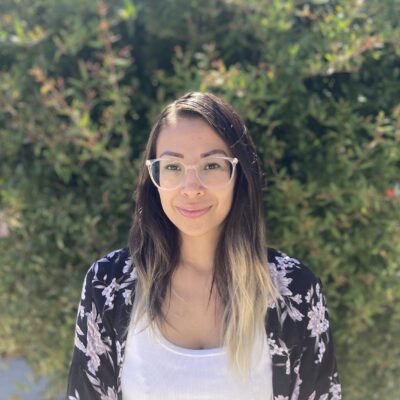From Silence to Self-Acceptance
I first learned about my abuela Cuca’s Alzheimer’s diagnosis years after she’d passed. I was chatting with my cousin when she casually dropped the fact. I must have looked confused because she stopped and stared at me for a moment before asking, “You didn’t know?” No, I didn’t know. Why didn’t my dad tell me? 
This wasn’t a new occurrence — feeling lost amid my family’s silence. We’ve never been great at talking about the hard things. I feel like I’ve always been the one trying to push for transparency, but it’s like swimming upstream. You can make progress, but the current is always there, threatening to pull you back under.
There’s been this weight pressing down on me for as long as I can remember. It’s not just the things left unsaid between the members of my family. All throughout my adolescence, I didn’t have the words for my own struggles either.
While my older brother was allowed to go out with friends and have sleepovers, I was expected home at the exact time it took me to walk back from my high school — my mom would even come looking for me if I was ‘late’. School was my only in-person social outlet and connection to the outside world. My life felt small. Confined.
I wasn’t confident either. When I was about three years old, I damaged one of my front teeth falling down some steps at my uncle’s house. The trauma from the fall caused the baby tooth to die, and when it finally fell out, my adult tooth never came in. I was so afraid of what others would think about my teeth that it pained me to even talk or smile. My older brother teased me relentlessly about it, further chipping away at my already low self-esteem. I was shy and reserved, and so I looked for ways to seem ‘cool’ as I felt my timidness and appearance wouldn’t get me far.
 How did I cope? Rebellion. I’d steal beer and liquor from the cabinet and bring it to school. I’d smoke marijuana before, during, and after school, even though it made my anxiety 10 times worse. I ditched school frequently, feeling disconnected from everyone and everything there and convinced it was a waste of time. I even ran away from home one August night around 3 a.m., setting out for Venice Beach with no money (I’d forgotten my piggy bank that I planned to exchange for cash at a Ralphs on the way) and no plan — though I doubt many 15-year-olds are great at forward thinking. It was a short, three-day experiment living off of free kettle corn samples and sleeping in a tent I had lugged with me in my backpack.
How did I cope? Rebellion. I’d steal beer and liquor from the cabinet and bring it to school. I’d smoke marijuana before, during, and after school, even though it made my anxiety 10 times worse. I ditched school frequently, feeling disconnected from everyone and everything there and convinced it was a waste of time. I even ran away from home one August night around 3 a.m., setting out for Venice Beach with no money (I’d forgotten my piggy bank that I planned to exchange for cash at a Ralphs on the way) and no plan — though I doubt many 15-year-olds are great at forward thinking. It was a short, three-day experiment living off of free kettle corn samples and sleeping in a tent I had lugged with me in my backpack.
As embarrassing as running away was — and I do still cringe every time someone brings it up — it was a wake-up call for both me and my parents. It dawned on me that I didn’t need to use drugs or neglect school to be cool. This realization was the start of an ongoing process to accept myself and be myself. I know I probably gave my parents a heart attack, but they loosened the reins a bit, likely in fear that I’d run away again.
When I hit my mid-20’s, the ever-present anxiety and depression transformed into something new. For months at a time I would hardly leave my bed, the smell of sweat and stale air lingering because I couldn’t muster the energy to care. I’d be in a fog for stretches of time, neglecting everything. And then, just as quickly, the fog would lift. I’d feel on top of the world. Invincible. Shiny. My new normal was a cycle, floating between extremes.
One of those cycles pushed me to my limit. I was tired of pretending like I could handle everything alone. It took me over a decade to realize that I couldn’t keep willing myself through it, and I finally gave myself permission to reach out for help.
Up until that point, I’d been somewhat proud of my ability to pick myself up when I was down and that I could figure it out on my own (even if it took some time). But I was wrong. It wasn’t until I fully accepted that there was not just no shame — but actually strength — in asking for help that I was able to break free from my new normal. I started by talking to my parents about how I was feeling, then my primary care provider, and I began taking antidepressants.
I also found an unconventional therapist, a rabbi with a background in organizational psychology. I was a weeping mess during our first session. Vulnerability felt foreign, especially when it came to the parts of myself that I consider ugly or embarrassing. Still, I soon looked forward to our sessions. I made enough progress that a little over a year later, I felt sufficiently equipped with new coping skills and insight and no longer needed to continue our sessions.
Now, at 31, the last few months of 30 felt like a smothering, weighted blanket of uncertainty, including having to upend my life and move to a new apartment while also trying to support a family member with an unexpected mental health crisis. Healing comes in layers, and I recognize that it’s time to reach out for help again. But this time, it doesn’t feel like failure. It feels like growth, acceptance, and new possibilities.
Writing is a powerful way to explore life beyond cancer. Here at A Fresh Chapter, we love featuring the voices and perspectives of our community through guest posts. If you are interested in sharing your story, contact us at info@afreshchapter.com.



Comment (1)
I loved reading this post and learning more of your story, T. A beautiful share and relatable theme.… The cycles of growth and how what once felt like failure can start to feel like strength. Cheers to that.